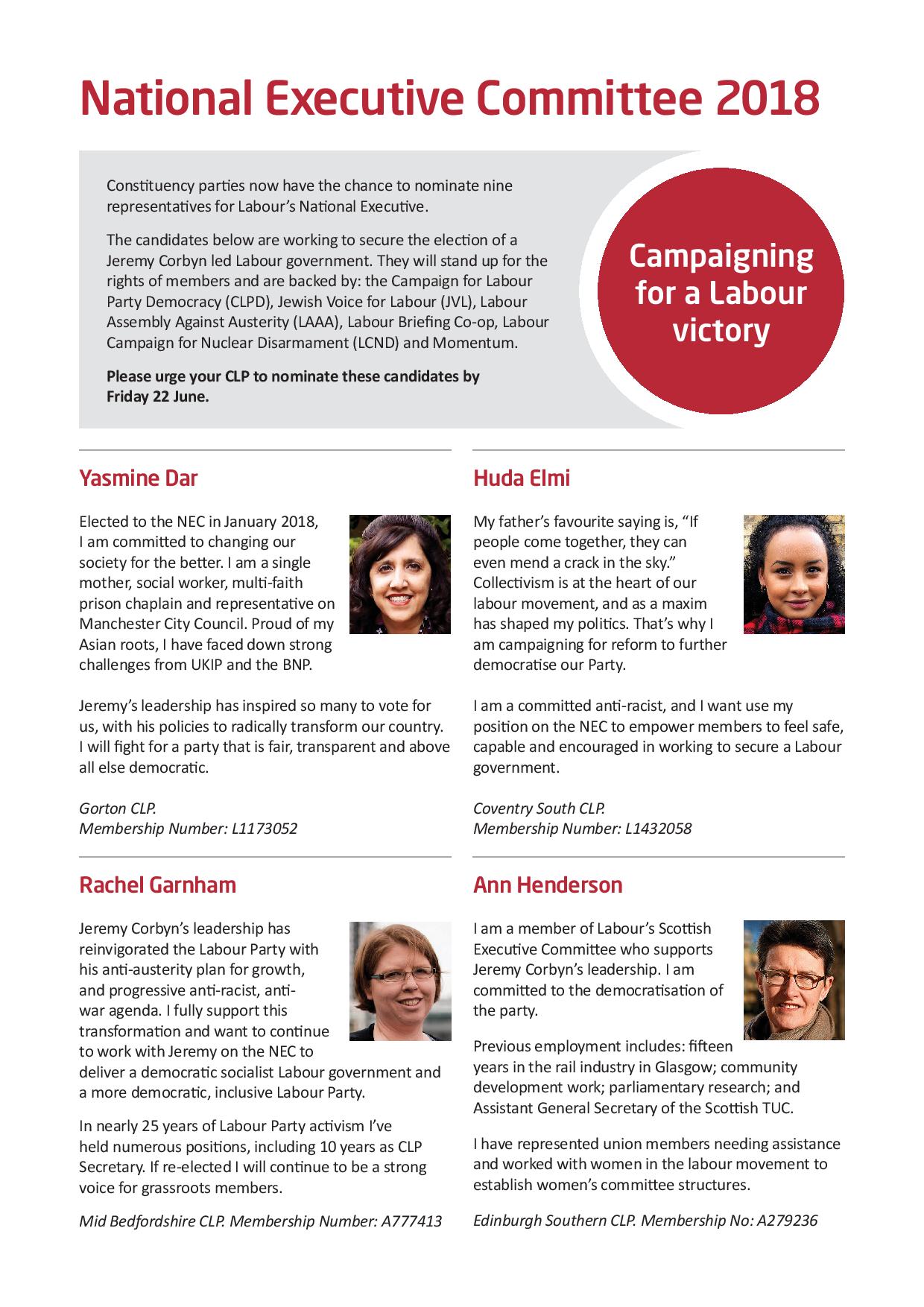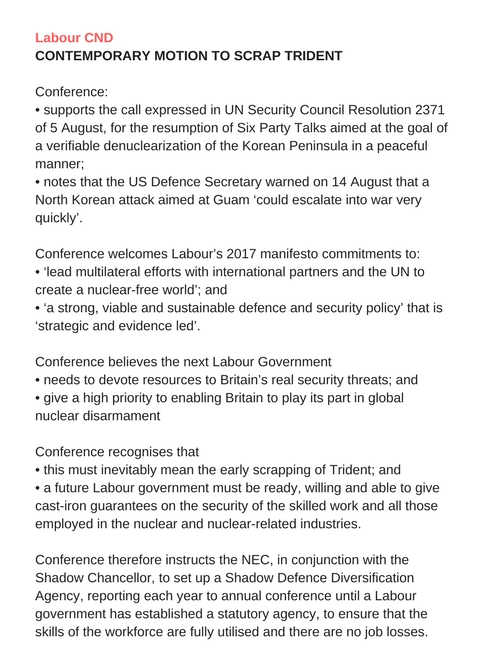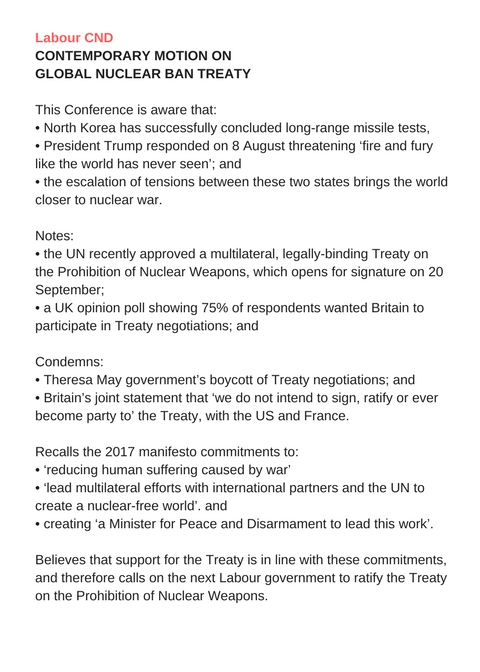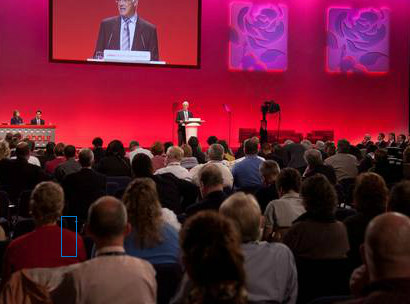Labour CND is supporting these candidates for this year’s National Executive Committee election:
Take a Contemporary Motion to your CLP
Labour CND has prepared two Contemporary Motions, which we hope Constituency Labour Parties (CLPs) will submit for debate at the Labour Party conference. Please do take these motions to your CLP meetings – if the motions are chosen by delegates as one of the four for debate at the conference and passed, they should become Party policy! Please note there is a 250 word limit on motions submitted for conference.
The deadline for submission of Contemporary Motions is 14 September. It is therefore essential that your CLP meets to discuss this issue before that date. We need as many submissions as possible to ensure that we cannot be ignored by the Conference Arrangements Committee (CAC).
CLPs say no to Trident
In recent months a number of CLPs have held discussions on Trident ahead of the policy review which will be undertaken by the Labour Party this year. You can see a selection of the motions which have been passed.
If your CLP would like a Labour CND speaker for a meeting on Trident, or if a motion is passed, please let us know by emailing info@labourcnd.org
East Devon CLP
East Devon Constituency Labour Party is opposed to the renewal of Trident
Richmond Park CLP
This CLP is in favour of scrapping the Trident Missile System and not replacing it
Tamworth CLP
This CLP believes that the Labour Party should oppose the replacement of the Trident nuclear missile system
Brent Central CLP
This meeting agrees that Trident should not be renewed
Birkenhead CLP
We call upon the next Labour government to scrap Trident due to the high cost, and the danger of maintaining it.
Littleborough & Lakeside Branch (part of Rochdale CLP)
This meeting notes that the projected replacement of the Trident Nuclear Missile system:
- Is set to cost ?167, 000, 000,000 at a time when Conservative austerity measures are depriving our local authority of the resources to pay for much needed and valued services,
- Will not address the real security challenges to this country such as climate change, terrorism or cyber attacks,
- Is a first strike, not defensive, weapon of mass destruction, incapable of distinguishing between civilian and military targets and whose effects will devastate this country as well as any enemy against which it is used,
- Is neither independent from the US nor a deterrent to warfare and serves only to maintain the illusion of power,
- Is illegal in that its effects are genocidal and therefore it contravenes the Geneva Convention. Renewing it would breach our commitment to the Non-Proliferation Treaty which the UK has signed and ratified.
This meeting resolves therefore to declare its opposition to the renewal of the Trident system and calls on the government to dedicate some of the resources saved by cancelling its renewal to be used to stimulate employment opportunities for those who would lose their jobs.
The meeting also calls on the Rochdale Constituency Labour Party to endorse this resolution and to recommend that it is adopted by the Party as part of its review of the national defence policy.
Hackney North and Stoke Newington CLP
This General Meeting notes:
- The current Government’s commitment to replace the existing Trident nuclear weapons system at a cost conservatively estimated at ?100 billion over a period of more than four decades. Indeed, the Tory chair of the Foreign Affairs Select Committee, Crispin Blunt MP, has suggested a figure exceeding ?165 billion.
- The likelihood of a parliamentary vote in 2016 on authorisation of a Trident replacement.
- The demonstration called by Campaign for Nuclear Disarmament (CND) and numerous civil society organisations for Saturday 27 February 2016 in opposition to Trident renewal.
This General Meeting believes:
- Trident and similar ‘weapons of mass destruction’ do nothing to enhance the security of the population resident in Britain, especially in a post-Cold War world.
- The expenditure of billions of pounds on a new, extraordinarily expensive weapons system is especially objectionable against a background of remorseless cuts in social welfare spending and most other areas of public expenditure.
- The campaign pledge from Labour Party leader Jeremy Corbyn to develop a Defence Diversification Agency policy to ensure socially useful, skilled employment for those workers in industries currently tied into the production of nuclear weapons and delivery system.
This General Meeting therefore resolves to publicise the 27 February demonstration to members and make sure the Hackney North CLP banner is present on the march; and copy this motion to our MP and the National Executive Committee.
Hackney North and Stoke Newington CLP
The General Meeting is against the renewal of the Trident system as it is not a deterrent; and because it makes no moral, practical or economic sense.
Annual Conference 2014 Resolutions
Labour CND has drafted two resolutions, one on Disarming Trident and a second on Ending US and UK military interventions in the Middle East.
It is vital that Labour CND supporters ensure these debates are heard at Labour Party Conference.
- Make sure your CLP discusses and submits one of these resolutions.
- Make sure your delegate is present at any relevant Conference Arrangements Committee meeting before conference.
- Make sure you promote the resolution to ensure it is prioritised for debate.
The deadline for receipt of contemporary motions is Thursday 11th September 2014 at 12 noon.
The title has a maximum of 10 words and the motion a maximum of 250 words.
Please email info@labourcnd.org.uk and let us know if your CLP is submitting one of these or a similar motion.
Disarm Trident
Conference notes the Message to Congress by President Obama of 24 July on the extension of the US-UK Mutual Defence Agreement.
Conference further notes that the Prime Minister failed to consult or inform Parliament before signing the extension ofthis Treaty and regrets this disregard for democracy by the Government.
Conference recognises the extension of the Treaty is to permit ‘the transfer of classified information concerning atomic weapons’ in order ‘to assist the United Kingdom in maintaining a credible nuclear deterrent’.
Conference further regrets that the extension to the US-UK Mutual Defence Agreement runs counter to our Non-Proliferation Treaty commitment to disarm our nuclear weapons.
Conference notes that Labour’s National Policy Forum of 18-20 July discussed almost 50 submissions on Trident.
Conference welcomes the NPF decision to recognise the success of past international bans on weapons of mass destruction such as landmines, clusster munitions, and chemical and biological weapons and supports a definitive commitment to disarmament.
Conference resolves that Labour will support an international process to ban nuclear weapons, as a complementary and necessary mechanism to our commitment to disarm UK nuclear weapons under the Non-Proliferation Treaty.
Conference resolves that Labour will disarm Trident and not replace it, and re-allocate spending to where it best serves our society, including developing an industrial plan to make use of the skills of those workers in the sector.
End US and UK Military Interventions in the Middle East
Conference notes the announcement by Foreign Secretary Philip Hammond of 15th August that the UK will provide military equipment to Iraqi and Kurdish forces in northern Iraq.
Conference notes with concern the spread of the Islamic State in both Syria and Iraq and their ethnic cleansing of ethnic and religious minorities in both states.
Conference notes with regret the US and UK military intervention in Iraq in 2003 which resulted in an estimated 500,000 civilian deaths, the creation of 4 million refugees, and enforced the destabilising disintegration of Iraqi state and security infrastructure.
Conferences expresses concern that further unilateral military action by US and UK forces could further entrench sectarian divisions and make the establishment of a peaceful and unified country more difficult to achieve.
Conference resolves that Labour will reject unilateral military action or arming of forces by the UK and calls for a UN-authorised humanitarian response and calls on the UN to facilitate urgent negotiations for the peaceful resolution of this conflict.
Conference resolution and fringe 2013
Contemporary Resolutions
Scrapping Trident is the subject of our model contemporary motion to Labour Party Annual Conference this year.
It is time the Labour Party seriously debated Trident, a throwback to the Cold War which consumes enormous resources that would be better spent elsewhere and with no relevance to the UK’s security needs.
It is vital that Labour CND supporters ensure these debates are heard at Labour Party Conference.
- Make sure your CLP discusses and submits one of these resolutions.
- Make sure your delegate is present at any relevant Conference Arrangements Committee meeting before conference.
- Make sure you promote the resolution to ensure it is prioritised for debate.
The deadline to submit motions is noon on 12th September 2012.
Please email info@labourcnd.org.uk and let us know if your CLP is submitting one of these or a similar motion.
____________________________________________________________________
Labour CND’s fringe meeting at Labour Party Conference
Join the debate on Trident the Labour Party needs to have.
Labour, Trident and the 2015 election
6.30pm, Monday 23rd September
Royal Albion Hotel, Old Steine Brighton (map)
Nick Brown MP
Jeremy Corbyn MP
Sheila Gilmore MP
Clive Lewis PPC
Nancy Platts PPC
Ann Black, NEC
Kate Hudson, CND
Refreshments provided
Email info@labourcnd.org.uk for more information.
Labour cannot remain silent on Trident

Labour’s policy review, much needed after 13 years in Government and a drubbing in May 2010, was said to have started from a blank page and would review all our commitments across the board. All, it seems, except Trident.
There has been some positive movement, the Britain in the World policy document stated there will be a discussion about Trident –
but only once the Lib Dem alternatives review has been completed. The fact that Ed Miliband welcomed the review is in itself an important step in itself. But why should Labour let the Liberal Democrats lead this debate?
At a grassroots level, this discussion is already being had. While the National Policy Forum proposal for a debate at some point in the future was presented to conference, MPs, MSPs, AMs, councillors and activists packed out the CND fringe in Manchester.
Neil Findlay MSP said spending £100 billion on renewing Trident would be “economically incompetent” and Katy Clark MP a
nd Julie Morgan AM both agreed that nuclear disarmament would be an electorally popular policy for Labour.
With the Government now pledging to spend £350 million on the next stage of Trident renewal, whilst cutting benefits from the disabled and slashing vital public services, its clear just how little economic sense nuclear weapons make. It also demonstrates that the Tories are determined to plough ahead with renewing our nuclear arsenal, regardless of Lib Dem opposition.
Labour’s lack of response to the latest announcement is remarkable and, in Scotland, the SNP are already atta
cking Johann Lamont for failing to respond when Trident’s submarines are based in Faslane.
Lamont has previously stated her opposition to Trident; saying in 1999 that she would support a motion calling for the weapons system to be decommissioned. If the party is truly to renew under Ed’s leadership then, Lamont should, as leader of Scottish Labour, be able to restate her belief in nuclear disarmament and show she’s in touch with public opinion.
The party cannot remain silent on Trident.
When even Tony Blair now admits that Trident is of no use as a strategic deterrent and itssignificance is purely political, surely Ed can admit its time to ditch this cold war relic.
The ‘Promise of Britain’ is not to deliver a future for the next generation where security is based on mutually assured destruction, it is about providing a society in which everyone has a fair chance to get on. Ed Miliband must be frank and say, in the words of the former chief whip Nick Brown, “we don’t need Trident and we can’t afford it”.ic choices in the next Parliament, there’s no way they could then go on to spend £100 billion on weapons of mass destruction that could kill millions.Scrapping Trident will send a bold signal to the world that the nuclear age needs to be put behind us and, as Nick Brown advocates, would allow the next Labour government to deliver a tuition fee cut that would re-open the doors to higher education for ordinary working class young people.
Conference Resolutions and Fringe
Contemporary Resolutions
Scrapping Trident and ending foreign military interventions are the subjects of our two model contemporary resolutions to Labour Party Annual Conference this year.
- Scrap Trident and support negotiations for a Nuclear Weapons Convention
- Reject military interventionism to focus on UK defence needs
It is time the Labour Party seriously debated Trident, a throwback to the Cold War which consumes enormous resources that would be better spent elsewhere and with no relevance to the UK’s security needs.
Similarly, after the Iraq, Afghanistan and Libya invasions, it is time the party discussed rejecting military interventions and focusing on real UK defence needs.
It is vital that Labour CND supporters ensure these debates are heard at Labour Party Conference.
- Make sure your CLP discusses and submits one of these resolutions.
- Make sure your delegate is present at any relevant Conference Arrangements Committee meeting before conference.
- Make sure you promote the resolution to ensure it is prioritised for debate.
The deadline to submit motions is noon on 21 September 2012.
Please email info@labourcnd.org.uk and let us know if your CLP is submitting one of these or a similar motion.
____________________________________________________________________
Labour CND’s fringe meeting at Labour Party Conference
Join the debate on Trident the Labour Party needs to have. It is time the Party discussed Trident, a throwback to the Cold War which consumes enormous resources that would be better spent elsewhere and which has no relevance to the UK’s security needs.
Cut Trident: Not Jobs, Health and Education
6pm, Monday 1st October
Arora Hotel, Princess St, Manchester [map]
Nick Brown MP
Katy Clark MP
Jeremy Corbyn MP
Julie Morgan AM
Neil Findlay MSP
Christine Shawcroft, NEC
Kate Osamor
Refreshments provided
Email info@labourcnd.org.uk for more information.
Labour’s Defence Policy Review and NPF
The Labour Shadow Defence Team has launched the Labour Party’s Defence Policy Review and is seeking submissions.
It is vital that members engage in and shape the debate particularly regarding the Labour Party’s current policy on the continued possession of nuclear weapons and engagement in foreign military interventions.
We must ensure the party commits to scrapping Trident and ending our role in destructive wars.
Labour CND has drafted two model responses for you to consider submitting both to the Defence Policy Review and to your National Policy Forum representatives.
You can do so both as an individual member and via your CLP.
- You can read them below or print off a pdf here.
The National Policy Forum Britain in the World Commission is meeting in mid-June so we suggest you do this immediately after the elections in May.
- Please ensure you submit this to the Labour Shadow Defence Review by emailing officeoflfof@gmail.com and posting to Shadow Defence Secretary Jim Murphy at the House of Commons, London SW1A 0AA
- You should also send it to your National Policy Forum representatives, via the MembersNet section of the Labour Party website – http://members.labour.org.uk/npfrep
- Please tell us if you have made such a submission, on info@labourcnd.org.uk
__________________________________________________________________
Labour and Trident replacement
Labour will put greater importance on working with other nuclear weapon states to increase progress on nuclear reductions and disarmament towards the goal of global abolition.
Labour will encourage non-nuclear states to also keep up their pressure for nuclear disarmament as required by the Nuclear Non- Proliferation Treaty.
Labour will back a global nuclear weapons convention with the ultimate aim of the total elimination of nuclear weapons.
Labour will make a clear commitment to scrap Trident and all plans for Trident replacement.
Supporting arguments:
The Labour Party needs to change its policy on Trident and its replacement.
Trident or its replacement does not address our real threats. Even the Coalition Government has confirmed that the UK does not face a nuclear weapon threat from another state, according to their National Security Strategy published in 2011. The possession of Trident does not increase our security. It is not a means of defence, it is means of attack. As such it could prove a magnet for attack in a conflict situation.
Trident or its replacement is a green light to nuclear weapons proliferation. It sends the wrong message at a point when the US and Russia are taking further disarmament steps. It is through honouring our nuclear disarmament commitment that we can achieve a nuclear weapons free world.
Trident replacement is unaffordable. Constructing and maintaining Trident’s replacement will cost over £100billion over its lifetime to 2060. In the shorter term the maintaining the existing Trident system and constructing the Trident replacement will cost us £55billion over the next 15 years.
Trident replacement is unpopular. There is clear and consistent polling evidence that shows the public is opposed to Trident replacement. Even amongst the defence community, many do not favour a costly nuclear weapon system in the face of other public spending cuts.
__________________________________________________________________
Labour and a new foreign policy
Labour will adopt a foreign policy that rejects military interventionism and nuclear aggression.
Labour will reject the principle that UK forces should operate anywhere in the world. Their only purpose should be for the defence of these islands.
Labour will support peaceful negotiations and dialogue through the UN and its member states, in conflict situations.
Labour will immediately withdraw troops from Afghanistan and advocate global disarmament, including a Weapons of Mass Destruction Free Zone in the Middle East and the scrapping of Trident here in the UK.
Supporting arguments:
Ed Miliband stated in his first speech as leader that ‘This generation wants to change our foreign policy so that it’s always based on values, not just alliances.’
The UK’s alliances, notably with the US and NATO or other Western powers, have led the country into numerous military strikes and wars in recent years, particularly Iraq and Afghanistan, under the justification of ‘liberal interventionism. This policy has damaged our international standing and lacks public support in the UK.
These interventions have been selective, seizing on certain internal conflicts and perceived threats, whilst ignoring others.
These interventions have left thousands dead and injured, harming rather than helping the people who live there and leaving behind countries that are neither stable nor safe.
These interventions have only been for the benefit of multi-national corporations and Western powers seeking to gain access to natural resources and infrastructure contracts.
Any justification for these wars has been seen to be lies to disguise the real intention of extending Western strategic control and interests.
The UK’s Cold War-era alliance, NATO, has expanded its sphere of influence by encouraging former Warsaw Pact countries to join and engaging in ‘out of area’ operations. Given the Warsaw Pact was dissolved twenty years ago, serious questions remain unanswered as to the role of NATO.
A progressive, socialist foreign policy requires resources and skills to be committed to reducing poverty and improving living standards rather than supporting military action and the instability and misery it causes.
Challenge to Labour front bench
 The Commons was enlivened by a debate on Trident replacement once again on Monday afternoon as the Defence Secretary was called to the Commons to answer an Urgent Question on his new £1.1 billion contract – heavily trailed in the Sunday press – to redevelop the Rolls-Royce plant at Raynesway in Derby and to produce the reactor for the first of the submarines replacing Vanguard.
The Commons was enlivened by a debate on Trident replacement once again on Monday afternoon as the Defence Secretary was called to the Commons to answer an Urgent Question on his new £1.1 billion contract – heavily trailed in the Sunday press – to redevelop the Rolls-Royce plant at Raynesway in Derby and to produce the reactor for the first of the submarines replacing Vanguard.
The idea of ordering a submarine reactor ahead of the main decision on constructing the rest of the submarine, at a cost of several hundred million pounds, is something I’ve repeatedly condemned in debates with the Defence Minister. As one part of the £4 billion declared ‘necessary’ to design the submarines before the construction decision, it is simply part of achieving a fait accompli so that a future government’s hands are tied. On the Today programme on Monday morning, the Lib Dem Defence Minister said it would be down to a future government to negotiate its way out of the contracts in 2016, but the Defence Secretary yesterday afternoon clearly said that Rolls-Royce depend of the commitment of the government.
One only needs to look at yesterday’s Evening Standard to see the arguments stating that ‘Trident is too costly to cancel’.
It was not made clear but it looks like we need to add another £500 million to the Trident replacement tab if these new facilities are necessary. The whole thing is a project which everyone expects to grow in cost exponentially, and yesterday illustrated that it is already doing so.
I was encouraged to see more Labour MPs questioning the government. Not only Paul Flynn and Michael Connarty but the questions from David Lammy, Nick Brown and Sheila Gilmore show there is a serious debate to be had in the Labour Party. Why should police numbers be cut to pay for Trident, rather than the other way round, as David asked.
But given this announcement arguably adds £500 million to the cost of delivering the replacement, it was disappointing that Labour’s front bench response gave such a wholehearted welcome of the ongoing programme, rather than offering serious scrutiny.
Alison Seabeck wrote that ‘keeping our nation safe’ should be ‘above partisan politics’. Indeed it should, but how we achieve that should be open to discussion, particularly in the Labour Party. Even the government’s own National Security Strategy said the threat of another state attacking with nuclear weapons is now of ‘low-likelihood’ but we are cutting all manner of other defence and public sector programmes and workers while saving Trident.
The reports from last weekend’s National Policy Forum sound very positive for the future and Jon Cruddas’s appointment as chair of the policy review is welcome given he joined me and many other MPs in demanding a debate on Trident at annual conference in 2006 ahead of the Commons vote and he has argued in favour of scrapping Trident to focus on forces welfare or conventional equipment, I hope we can now have an honest and mature debate about our defence spending priorities.
By Jeremy Corbyn MP
Originally published on LabourList on 19th June 2012
Our Refounding Labour submission
 Our letter to Partnership into Power Review is attached here, and displayed below.
Our letter to Partnership into Power Review is attached here, and displayed below.
PiP Reform Consultation
c/o Policy and Research Unit
The Labour Party
39 Victoria Street
London
SW1H 0HA
Dear friends,
Please accept this letter as a submission to the extended Refounding Labour consultation from Labour CND – a caucus of Labour Party members who are also CND members.
That the consultation is taking place is welcome. We believe there has been a fundamental disconnect between the Labour Party leadership and its members acros the country in policy making. The leadership has not consulted or afforded members a sufficient role in deciding policy under the Partnership in Power process.
It is of concern that the two year policy review being led by Liam Byrne has failed to make use of the existing policy making structures of the Labour Party and exposes the need for a Refounding Labour process that provides greater accountability to, and empowers, the membership to play a greater role in deciding party policy.
For ourselves, a clear example of the failure to engage the membership, is the party’s lack of debate on UK nuclear weapon possession for many years, despite taking a decision in government to putrsue a new nuclear weapon system with a lifetime cost of £100 billion. This failure was made all the more stark by the methods used to prevent the subject being debated when it was clear members wished to do so, particularly at the 2006 Annual Conference.
Labour CND would therefore like to propose the four amendments to the existing policy making process overleaf to be considered collectively or individually.
Yours sincerely,
Joy Hurcombe, Chair
Walter Wolfgang, Vice-President
Submission to Refounding Labour – Partnership into Power Reform Consultation
Remove the ‘contemporary’ straitjacket
The ruling requiring resolutions to be ‘contemporary’, referring to events occurring after the final pre-conference National Policy Forum meeting should be removed. The ruling is vaguely written, providing members with little useful guidance, but us nonetheless an unfair straitjacket. That a subject has been discussed is no reason to prevent delegates at the annual conference debating and voting on an issue – to do so is undemocratic in the extreme.
The conference should debate eight prioritised resolutions
The rules currently allow for the constituency parties to prioritise four contemporary resolution subjects by ballot at conference, and for the affiliates to do the same. This should ensure eight subjects are debated, but the current practice means that subjects commonly prioritised by both sections mean fewer than eight subjects are put on the conference agenda. A simple solution would be to take four from the constituencies and four from the affiliates, or allow the sections to vote as a college and take the top eight agenda items.
Allow CLPs and affiliates to submit amendments to NPF documents
As the sovereign body of the party, the annual conference should be provided with a mechanism to amend the National Policy Forum’s policy commission documents. The documents should be published with sufficient time for constituencies to submit at least one amendment to the policy commission documents, to be debated at conference.
End the ‘take it or leave it’ vote on whole NPF documents
Each year when the NPF policy commission documents are debated at conference, an effective ‘take it or leave it’ single vote is held on a large document covering a huge range of issues. This requires conference delegates to vote for or against a whole document where they may agree with a significant proportion, but hold strong reservations on other areas. A mechanism that would allow delegates to identify a body of text in the document and hold a separate vote on that contentious item would ensure the policy documents more closely represent Labour members views.







